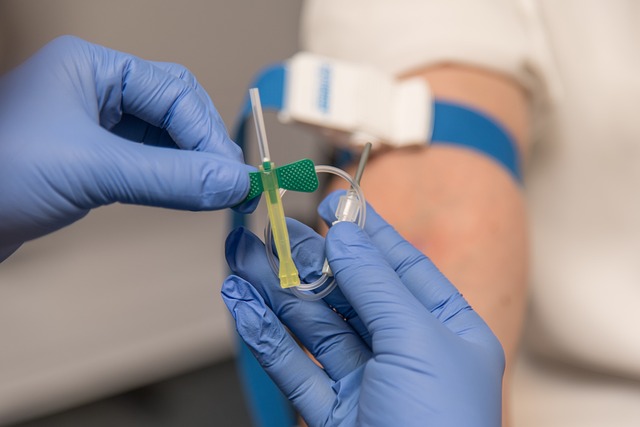Thyroid health is vital in the UK, with conditions like hypothyroidism and hyperthyroidism affecting millions. Early detection through regular screening, including a standard thyroid examination kit featuring a UK Cholesterol Blood Test, is key to preventive care. This test measures Total Cholesterol, LDL, HDL, and Triglycerides, providing insights into cardiovascular health as thyroid disorders can impact cholesterol profiles. Understanding thyroid test results, with key hormones thyroxine (T4) and triiodothyronine (T3), helps interpret overall health, guiding doctors to optimize thyroid function and manage cholesterol levels effectively.
In the UK, maintaining thyroid health is paramount as it influences overall well-being. Understanding thyroids, small glands that regulate metabolism, is crucial due to their significant impact on energy levels, weight, and body temperature. This article explores the importance of regular thyroid check-ups using a standard thyroid examination kit, similar to a UK Cholesterol Blood Test, to detect potential issues early. We’ll break down kit components and guide you through interpreting test results, empowering UK patients to take charge of their thyroid health.
- Understanding Thyroid Health: Why It Matters in the UK
- Components of a Standard Thyroid Examination Kit
- How to Interpret Your Thyroid Test Results: A Guide for UK Patients
Understanding Thyroid Health: Why It Matters in the UK
Thyroid health is a crucial aspect of overall wellbeing, and its importance cannot be overstated in the UK. The thyroid gland, located at the base of the neck, plays a vital role in regulating metabolism, influencing growth and development, and maintaining energy levels. Disruptions to thyroid function can lead to various conditions, such as hypothyroidism or hyperthyroidism, which affect millions of people across the UK. Early detection is key; regular screening through a standard thyroid examination kit enables healthcare professionals to identify potential issues swiftly.
The UK’s emphasis on preventive care further highlights the significance of understanding and monitoring thyroid health. A simple UK Cholesterol Blood Test can provide valuable insights into an individual’s overall well-being, including their thyroid function. By incorporating such tests into routine check-ups, patients can take proactive steps to manage their health effectively, ensuring a healthier and more vibrant future.
Components of a Standard Thyroid Examination Kit
A standard thyroid examination kit for UK patients typically includes a comprehensive set of tools and reagents designed to facilitate accurate diagnosis of thyroid-related disorders. Central to this kit is the UK Cholesterol Blood Test, which measures levels of Total Cholesterol (TC), Low-Density Lipoprotein (LDL) cholesterol, High-Density Lipoprotein (HDL) cholesterol, and Triglycerides (TGs). This provides a crucial snapshot of cardiovascular health, as thyroid conditions can often impact cholesterol profiles.
Beyond the blood test, the kit may also incorporate other essential components such as collection tubes with specific anticoagulants to preserve sample integrity, detailed patient instructions for sample handling, and pre-labeled forms for recording medical history and test results. Some kits might even include a digital thermometer for accurate body temperature readings, as thyroid function is closely linked to metabolic rate and overall body temperature regulation.
How to Interpret Your Thyroid Test Results: A Guide for UK Patients
Interpreting your thyroid test results is a crucial step in understanding your overall health, especially for UK patients considering a UK cholesterol blood test. Thyroid function tests typically measure the levels of thyroxine (T4) and triiodothyronine (T3) hormones in your blood. Normal ranges vary slightly between laboratories, but generally, T4 levels should be between 9 to 15 micrograms per deciliter (mcg/dL), and T3 levels fall within 3.3 to 6.7 picograms per milliliter (pg/mL).
If your results fall outside these ranges, it could indicate hypothyroidism (low thyroid activity) or hyperthyroidism (overactive thyroid). For example, low T4 levels might suggest an underactive thyroid, while high T3 levels can point to an overactive one. Your doctor will consider other factors, such as your symptoms and medical history, to help interpret the results accurately. They may recommend further tests or specific treatments based on these findings to ensure optimal thyroid function, which is essential for maintaining overall health, including managing cholesterol levels.
A standard thyroid examination kit is an essential tool for UK patients seeking to manage their thyroid health. By understanding the importance of thyroid function in overall well-being and equiping ourselves with the right resources, such as a comprehensive test kit, we can proactively navigate our healthcare journey. Interpreting test results correctly, guided by reliable sources like this article, empowers us to make informed decisions about our thyroid health—a crucial aspect of overall wellness in the UK.
